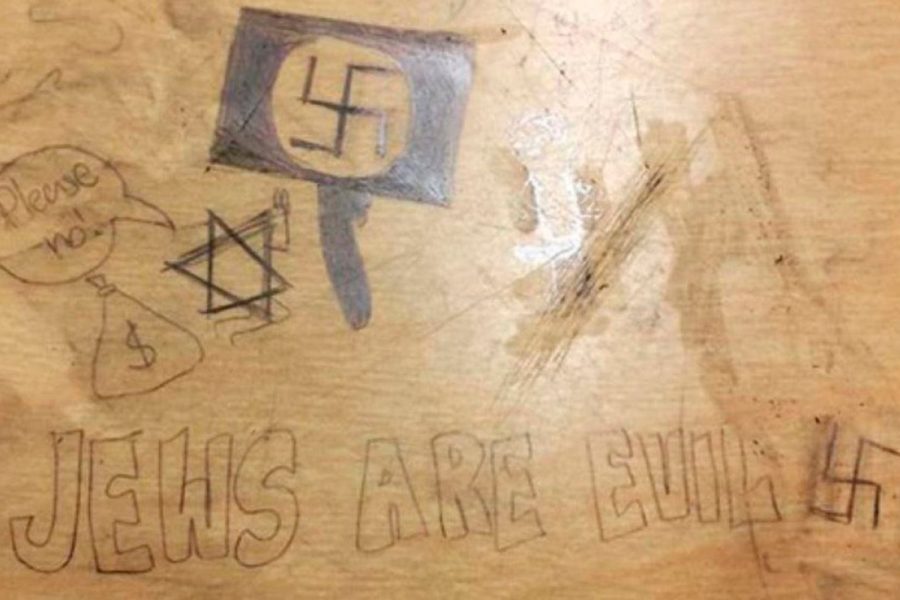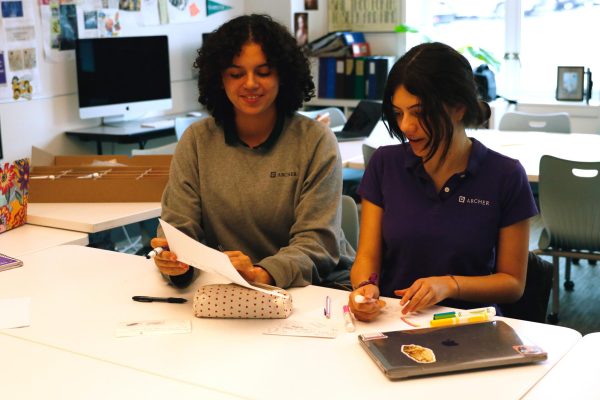‘I felt broken’: Anti-Semitism impacts students in Newport Harbor, Alameda schools
When now 16-year-old Alameda High School student, Natasha Waldorf, walked into her classroom one morning during her freshman year, Waldorf found etchings on her desk done by fellow students The etchings contained the phrase “Jews are evil” as well as swastikas. Waldorf struggled with anxiety through the rest of her freshman year as she dealt with anti-Semitic instances from her fellow classmates. Photo courtesy of Natasha Waldorf.
At a high school party on March 2, smiling Newport Harbor High School students gathered around plastic red cups laid on a table in the shape of a swastika. Along with the swastika, eight teens in the photo performed a Nazi salute for the camera. The morning after, pictures taken at the event were circling platforms including Snapchat, Twitter and Instagram.
Newport Beach High School, which is part of the public Newport-Mesa Unified School District, permitted an investigation of the photo by law enforcement. The swastika made out of cups used for a drinking game caused shockwaves on Twitter and resulted in a direct statement from the Newport-Mesa Unified School District.
“We were recently made aware of social media postings involving some students who created inappropriate anti-Semitic symbols and possible underage drinking,” The Newport-Mesa Unified School District wrote in a letter to parents of students in the school district. “While these actions did not occur on any school campus or school function, we condemn all acts of anti-Semitism and hate in all their forms.”
After the circulation of the photograph, a few Newport Beach High School students deleted their social media accounts due to the backlash against the anti-Semitic display. Congressman Katie Porter also condemned the photo in a Twitter statement.
“I condemn this display of a hateful, anti-Semitic symbol and call on parents and community leaders to redouble our efforts to educate young people about the history of violence against Jewish people worldwide,” Porter tweeted. “This has no place in Orange County.”
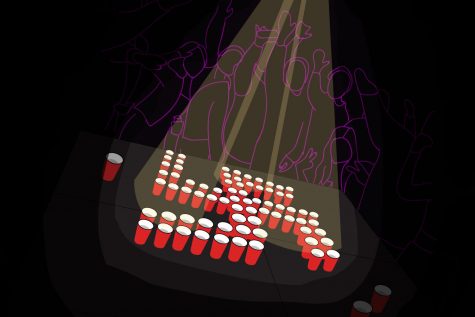
A week later, another anti-Semitic incident occurred in the Newport Harbor community when, on the weekend of March 9, students vandalized the Newport Harbor High School campus, plastering it with at least 10 Nazi-related posters. Newport Harbor administration called law enforcement shortly after the posters had been taken down.
In response to the Newport Harbor party, California State Superintendent of Public Instruction Tony Thurmond said he wants to “engage young people in the conversation” in order to “prevent” anti-Semitic expression in the future.
“We have been tracking incidents like this, but there is no easy solution,” Thurmond said. “I am working on a campaign now on social-emotional learning to help build empathy and prevent bullying. Efforts like that will help, but we need communities to come together to determine how we should respond.”
Maddie Jacobson ’19, who founded the Jewish Student Community along with fellow senior Rae Godfredsen, believes that education would be the best course of action in moving forward from the situation.
“The kids involved should be more educated and realize just how much impact what they did has on the world,” Jacobson said. “I think education about empathy and personal experiences is really necessary.”
Jacobson recognizes the media coverage and widespread attention that the Newport Harbor scandal has received in contrast to other anti-Semitic incidents in California high schools.
“I have noticed a rise in anti-Semitic incidents in Californian high schools,” Jacobson said. “We mostly have only heard about the Newport Beach scandal, but beyond that, there are a lot more things that just aren’t being as widely broadcasted, such as drawing swastikas on bathroom stalls or posting anti-Semitic tweets.”
Sixteen-year-old northern Californian high school student Natasha Waldorf experienced anti-Semitic incidents similar to those that Jacobson referenced. In 2016, at start of her freshman year at Alameda High School in Alameda, California, Waldorf began receiving anti-Semitic texts from an unknown number.

“[The unknown number] called me a ‘big-nosed-k—,” Waldorf said. “That ‘Hitler’s biggest mistake was killing my family’ and that if I didn’t like what they were saying, I should just ‘stop being Jewish.’”
Waldorf became a target for anti-Semitism when she discovered that the “unknown number” was, in fact, a fellow Alameda student.
A few days after the texts began, Waldorf and a friend overheard a classmate making “Holocaust jokes”; however, when the two friends confronted the classmate, the classmate responded, “Hitler should have thrown your families in the oven.” Waldorf said the anti-Semitism followed her throughout her freshman and sophomore years at Alameda after she found multiple swastika graffiti around the high school.
In her sophomore year, Waldorf went to the administration to report all of her anti-Semitic experiences. However, the administration did not “follow up” with Waldorf on any of their promises to her.
The Oracle reached out to the Alameda School District for a comment but did not get a response.
“[The administration] assured me that I would receive apologies from the perpetrators,” Waldorf said. “After, only one apologized, and no one from the administration followed up to ensure all the apologies happened. Another school in our district even went as far as to say one of the swastikas was ‘less than an inch tall’ so it ‘wasn’t really a big deal.’”
Waldorf was forced to remain in class with perpetrators for the rest of the year, resulting in her feeling “broken.”
“I was missing school…due to my anxiety of facing these people in class, having panic attacks near every morning,” Waldorf said. “I couldn’t trust people. I felt anyone could be waiting at the right moment to attack me or my family.”
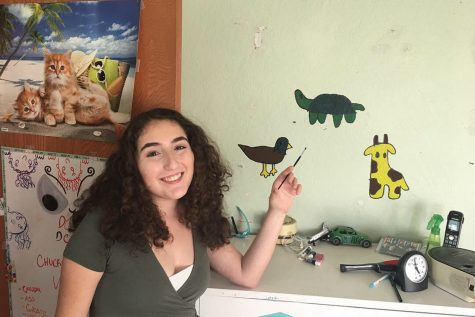
Waldorf, who still remains at Alameda High School and lives in the Alameda area, is now separated from the perpetrators as they are “no longer allowed to be in class with [her].” Even though the administration has become “stricter,” according to Waldorf, in cases of anti-Semitism, she still carries “fear” being Jewish in Alameda High School.
“My ears still perk up every day when I hear the words ‘Jewish’ or ‘Israel,’ fearing that these words will be full of hatred,” Waldorf explained. “To this day I still continue to see swastikas [around Alameda,] but at least the administration is stricter about dealing with them. All I can hope is that new students in the school district will be spared from what I went through.”
According to NPR, a spike in anti-Semitic incidents occurred in 2017 with every state reporting an act. Among the states, California had one of the highest recorded numbers in incidents due to the Jewish population of over 1 million. In 2016, the time in which Waldorf started to receive anti-Semitic text messages, California reported having the highest number of incidents in the country, with an increase of 21% from the previous year.
“My hope is that we have days where no one feels disrespected for the color of their skin, their religion, their sexual preference, their socioeconomic status, etc,” Thurmond said. “Everyone deserves to be treated with respect.”
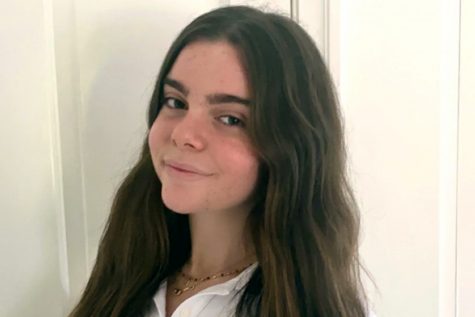
Lola Lamberg was on the Oracle staff for four years from 2017 until her graduation date of 2021. Lamberg joined the Oracle in 2017 as a political columnist...



